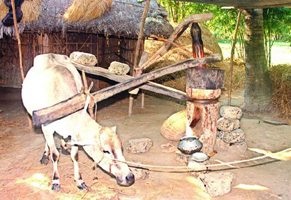Kalu
Kalu (oil presser) refers to a specialised professional community engaged in extracting edible oils from oilseeds. Pressing oil by indigenous technology is an old tradition in Bengal. About 2,300 years ago there was a terrible famine at pundravardhana and to tackle the situation, the Maurya Emperor released from the state store paddy and oilseeds of til (sesame) and mustard for distribution among the people. People pressed oilseeds at their own homes to make oil. The word kalu is derived from a Hindi word kalhu. In Birbhum and Nadia districts of West Bengal and the natore region of Bangladesh kalus are called khalus. The lexical meaning of the word is 'a community of Hindu and Muslim oilmen'.

Their life revolves round extraction and sale of edible oils. According to the popular belief, kalu and teli (tili or tailik) have the same meaning. However, the kalus extract oil by pressing oilseeds while telis specialise in selling oil. At present, indigenous technology of pressing oil is replaced by wooden mills and mechanical mills.
Kalus use a variety of devices to extract oils. At Saraikala in northern Orissa 3 different mills or presses are used. These are: a wooden press without an oil hole pulled by two bulls; a wooden press with an oil hole but pulled by one bull; and a 2-piece wooden press with an oil hole pulled by one bull. The first type of press is made of one piece of strong wood and the major part of it is buried in the soil; the remaining part is above the soil. Its top is hollow to receive the seeds, which are pressed by a hefty stick. This press is called ghani. When its top is worn out it is cut off. In the second type of press, a pair of bulls is tied to a piece of timber called panjari. A piece of wood with cloth tied to it is placed inside to absorb oil. The mill that uses 2 bulls is called ghana and has a long piece of wood as against the shorter piece of wood used by the one-bull mill, which is installed within the house. The 2-bull mill is installed outside. The community of people pressing oil by using two-bull mills is known as tailis and called porihari. The brahmans and the Vaishnavs do not accept water from them. One bull runs the third category of ghani. It is also called ghana and is made of strong sal wood.
Ghanis drawn by one bull or two bulls are in use in different parts of the subcontinent including Bangladesh. In the southern part of Bangladesh the people generally use one bull for drawing the ghani. Ghanis having no holes and drawn by 2 bulls are seen in Indian States of Orissa and Andhra Prodesh of India. Such ghanis are also used in Midnapore and Hughli of West Bengal and in Gujrat. Bulls or horses usually draw the ghanis in Bangladesh. The local ghanis are nine feet in height and about a half of it is buried in the soil to make it firm. At times the driver of the ghani sits on a plank at its top to add weight for better pressing of the oil seeds. Oil siphons out through a pipe.
The chief of the kalu community is called paramanik. At the end of their names they use Bepari or Chowdhury as surnames. In some areas of mymensingh men draw ghanis. Kalus make all kinds of edible oils and sell oilcakes. The oilcake of til seeds is used as manure.
Most kalus in Bangladesh are Muslims. Hindu kalus are a few in numbers. Although kalus are regarded as a low class among both Muslims and Hindus, Muslim kalus perform religious rites together with other Muslims and also attend the same mosques for prayer. But Hindu kalus live a relatively more secluded life and confine their social activities within their own community. Usually, 5-7 kalu families live at one place. Once upon a time all kalus, like the rest of the people, were Hindus and used to have caste distinctions. This has not gone away even after their conversion to islam. The kalus marry among themselves.
Kalus are now finding it difficult to maintain their trade, especially in areas where mechanised oil mills have been established. A wooden ghani drawn by an animal can at best press 20 kg of seeds a day while a mechanised mill can press 100 kg of seeds. The animals used at the ghanis have to be retired from time to time for rest. These days, kalus cannot earn more than Tk 25-30 a day. There is also the shortage of oil seeds in the market. Thousands of ghanis have already disappeared, especially in areas where electricity has made it easy for mechanised mills to be set up. Mustard oil is expensive now and cannot compete with cheaper soybean and palm oil. More and more people of the country are switching over to soybean and palm oil for cooking. This is how the profession of kalus has been hit hard. [Amjad Hossain]
